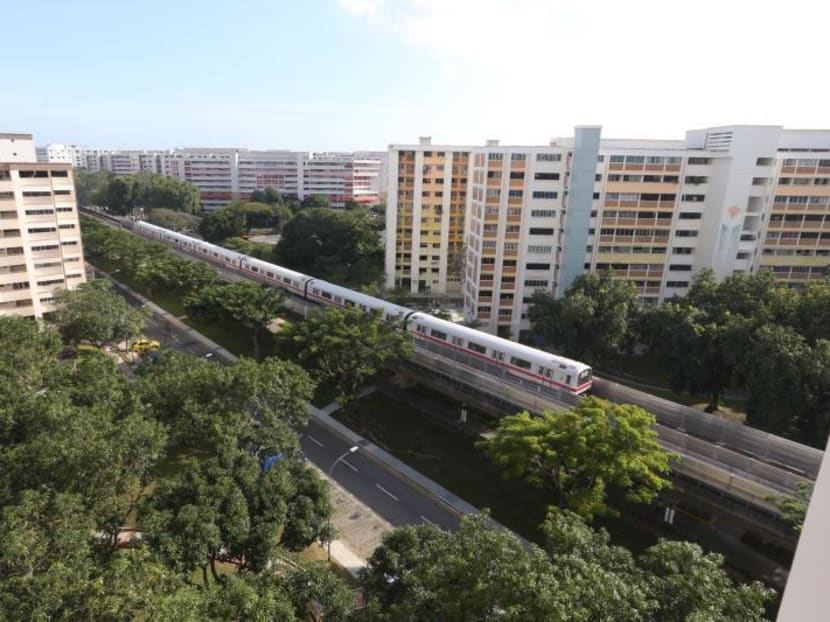Shortened hours on EWL freed up ‘40 nights’ of extra time for signalling work: Ng Chee Meng
SINGAPORE — The curtailed operation hours on the East-West Line (EWL) over the past two months gave rail operator SMRT the equivalent of 40 nights of extra time to test and install the new signalling system, Second Transport Minister Ng Chee Meng told Parliament on Monday (Feb 19).
SINGAPORE — The curtailed operation hours on the East-West Line (EWL) over the past two months gave rail operator SMRT the equivalent of 40 nights of extra time to test and install the new signalling system, Second Transport Minister Ng Chee Meng told Parliament on Monday (Feb 19).
This would have otherwise taken another 1.5 months to complete, Mr Ng said in response to a question by Member of Parliament Henry Kwek on the shutdown of MRT lines for planned maintenance in recent months.
Mr Ng said the curtailed hours also helped the embattled rail company manage 2.5 times the usual volume of maintenance work along the affected stretches each weekend.
The installation of noise barriers has also been sped up to roughly 1.5 times the usual pace, with workers finishing the equivalent of three or four nights of work every weekend.
The Government is studying how further downtime on the MRT lines could help speed up the renewal of other equipment on the North-South and East-West lines, the oldest MRT lines in Singapore. These include the upcoming replacement and upgrade of the power-supply system.
Earlier this month, the Land Transport Authority announced the award of contracts to upgrade the power-supply and track-circuit systems of the two lines.
Work will begin this year and is targeted to wrap up by the early 2020s.
The shortened operation hours on the EWL began in December and affected 19 stops on the western section of the line — including two on the North-South Line. Between last month and early this month, 10 stations on the eastern stretch of the EWL also had their operation hours trimmed on weekends.
On Fridays and Saturdays, the affected stations shut earlier at 11pm. On Saturdays and Sundays, they opened later at 8am. There were also several all-day closures of the affected stations on Sundays.
Next month, the reduced hours will be widened to all 35 stations on the EWL until the first Sunday of April, SMRT announced earlier. Aside from cutting operation hours on weekends, two weekdays during the week-long March school vacation — March 12 and 14 — will see stations along the entire line close at 10.30pm.
The downtime was announced last November after the high-profile collision of two trains at Joo Koon MRT Station. It will hasten work to get a new signalling system going on the EWL by June, instead of year’s end.
Mr Ng hinted that the shortened hours are here to stay, and the authorities will “continue with this regime for the foreseeable future to expedite the upgrading and improvement works”.
“We will minimise inconvenience to commuters by (making) early announcements of the scheduling of either early closures of the line or entire closure of stretches, so that commuters can make alternate transport plans,” he said. “Buses and other alternatives will be made available to commuters.”
In Parliament on Monday (Feb 19), Non-Constituency MP Leon Perera from the Workers’ Party also asked about cases of irregular and sudden acceleration, as well as of train doors shutting without warning, on the MRT and Light Rail Transit (LRT) systems.
Responding, Mr Ng said the bulk of such cases over the last five years happened on the North-South and East-West lines. There were an average of 20 cases of irregular and sudden acceleration reported by commuters each year on MRT trains and two cases a year on the LRT.
The shifts in speed resulted from temporary speed restrictions owing to continuing track maintenance and renewal work, the minister said.
On train doors closing without warning, passengers reported an average of 125 cases yearly on the MRT, and fewer than one case each year on the LRT.
Right now, train captains close the doors manually only on the North-South and East-West lines, which creates room for human error. “The new communications-based train control signalling system will address this by automating the announcement and closing of train doors,” Mr Ng said.
Data is derived primarily from reports by commuters, and every case is investigated thoroughly. Mr Ng said the Transport Ministry, which already publishes various sets of data, will consider releasing such information “in time” as the renewal of the train systems was still underway.









